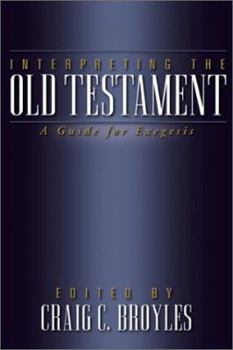Interpreting the Old Testament: A Guide for Exegesis
Select Format
Select Condition 
Book Overview
Written and edited by scholars, this book provides practical help to students as they seek to interpret and apply the Old Testament.
Format:Paperback
Language:English
ISBN:0801022711
ISBN13:9780801022715
Release Date:October 2001
Publisher:Baker Academic
Length:272 Pages
Weight:1.00 lbs.
Dimensions:0.7" x 6.0" x 9.0"
Age Range:18 years and up
Grade Range:Postsecondary and higher
Customer Reviews
1 rating
Examining the exegetical toolbox.
Published by Thriftbooks.com User , 18 years ago
This collection of essays is primarily a text intended for graduate students of theology or biblical studies or for individuals researching sermons, in either case with some knowledge of Hebrew/Aramaic/Greek assumed, or at least preferred. But anyone interested in Old Testament exegesis will gain a great deal from this book. Interestingly, it seems that, for most of us, personal knowledge of ancient languages is less necessary to the close study of the Jewish Bible (what Christians call the Old Testament) than it was in the past. Careful comparisons of the many translations now available (based on two respected approaches to translation) may be of more value than one or two years study of biblical languages. Critical exegetical guidance, commentary and insight are also readily available and these sources begin with the ancient exegetes, whose works are also available in English and other modern languages -- these many sources notably including Philo, Origen, and the Talmudic rabbis, for example. One must notice that the ancient exegetes recognized the need to be careful, even tentative, in light of their own cultural, literary, and religious assumptions -- how much more so should we, so many centuries and cultures removed, be careful? From the ancient exegetes we learn scholarly humility and the necessary respect for our separation from the Ancient Near Eastern (ANE) literary conventions and contexts of the texts, apart from which understanding is not possible in many instances. Broyles reminds us that, "although divine in origin, the Bible is not a book 'dropped from heaven,' without human mediation. Nor is it a handbook of theological principles that are immediately accessible and applicable to all cultures at all times. It uses literary forms and imagery that are not immediately plain to modern readers (e.g., why does Yahweh call to the heavens and the earth when bringing an accusation against the people in Ps. 50:1-7 and Isa. 1:2-3?). Its many obscure references--from Abaddon to Zion--illustrate that the Bible is wrapped in history. The Bible makes the profound claim that God acts in history, but this entails a need for history lessons. Even the most uninitiated reader of the Bible soon becomes aware that God's means of revelation are human, including language, literature, history, and culture." Over against the simplistic "proof texting" approach which children learn in Sunday School, and which easily fails critical examination (perhaps as easily as by mere counter- proof texting), sound exegesis is a process of organic synthesis by which we first spend some effort gaining a sense of the forest before "we proceed from the 'forest' to the 'trees'." While some of the essays here are less useful than others, Broyles' contributions, as well as those of Long, Bimson, Martens, and Hess, are particularly good and overall the book is excellent. The merits and problems of all serious approaches come into play, including the so-called documentary hy





